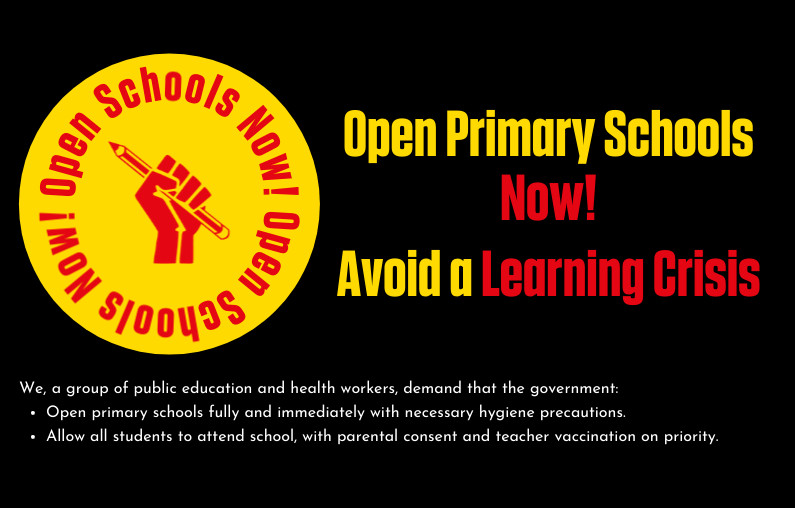IT for Change has drafted a statement, endorsed by a group of educationists and social work organizations, about the urgent need to open all primary schools to avoid a crisis of learning. Read it below:
1. The Karnataka education department has opened schools selectively. Classes 9-12 have regular classes, and 6-8 have intermittent classes. There is information that classes 1-5 have not been and will not be opened.
2. This will be a man-made crisis, and must be avoided completely.
3. The Azim Premji Foundation's research covering multiple states of India released last week, has uncovered heart-breaking findings:
- 92% of children on an average have lost at least one specific language ability from the previous year across all classes.
- 82% of children on an average have lost at least one specific mathematical ability from the previous year across all classes.
- This overall loss of learning – (regression or forgetting) of what children had learnt in the previous classes plus the current year loss – is going to lead to a cumulative loss over the years, impacting not only the academic performance of children but also their adult lives.
- Teachers were categorical that they wanted the children to come to school as soon as possible so that teaching can start systematically. There is no alternative to physical classroom learning, in a facilitating environment.
4. The ‘social loss’ of children’s ability to navigate adult life, impacts younger children in classes 1-5 even more deeply because initial years are very critical for socialization. Neglecting classes 1-5 is likely to lead to much higher, devastating dropping out of schools by students over the next decade.
5. Teachers need adequate time for students of each class to cover competencies required at each grade of schooling and every day/week lost needs to be compensated.
6. No spike in Covid-19 cases has been reported across the entire state. Additionally, it is an accepted medical fact that Covid-19 has the least impact on young children, and hence it is completely inexplicable why medical reasons are cited for keeping classes 1-5 closed.
7. In any case these children and their families are interacting with others in their communities, within which their schools are located, so opening schools will not create much more risk.
8. Keeping only schools shut seems a callous approach towards the children from disadvantaged sections of society. Keeping children out of school has created a learning crisis with serious and severe long term damage.
9. Andhra Pradesh has opened classes 1-5 sometime back. Karnataka should follow.
10. On behalf of students, parents, teachers and schools, we demand that all
- Primary schools be allowed to open fully and immediately continuing hygiene measures and precautions.
- All students should be able to attend school, with parental consent and teacher vaccination on priority.
11. At the very least, allow us to provide our inputs to the decision makers, including the ‘Technical Approval Committee’.
Endorsed
- Niranjanaradhya.V.P., Senior Fellow , Centre for Child and the Law, National Law School of India University
- Dr. Mahesh Kumar Rathod, Academic Council Member, Gulbarga University Kalaburgi
- Rajendran Narayanan, Azim Premji University
- Dr. Sylvia Karpagam, Public Health Doctor and Researcher
- Dr.Srinivasa Kakkilaya, M.D.,Medical Expert, Mangalore
- Moyyuddin Kutti, President, SDMC Coordination Forum
- B. Sripada Bhat, Samana Shikshanakkagi Janandolan
- All India Students Federation
- Sriranjani Ranganathan, Educationist
- Gurumurthy Kasinathan, IT for Change
- Y.J. Rajendra, PUCL, Karnataka
- Reshma, Action Aid, Bengaluru
- Sarovara, Karnataka Vidyarthi Shakti
- Shankar Halagatti, Former Chairperson, Bala Academy, Dharwad
- Nagesh Aralakuppe, Karnataka Vichara Vedike
- Ananda, Banavasi Balaga
- Dileep Kamath, Senior Activist, Belgaum
- Dr.Vasundhara Bupathi, Renowned Writer and the Chairperson, U.Bhupati Meorial Trust
- Sravanthi, Teacher
- Rishikesh, Azim Premji University
- Amman Madan, Azim Premji University
- Prakash Iyer, Azim Premji University
- Kinnari Pandya, Azim Premji University
- Giridhar Rao, Azim Premji University
- Ankur Madan, Azim Premji University
- Aruna V., Azim Premji University
- Talha Ismail Bengre, Researcher, Center for Educational Research and Training

